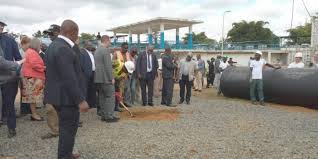To alleviate the struggle for safe drinking water, President George has broken ground for the construction of an US$18 million raw water pipeline between the dam of the Mount Coffee Hydro-power Plant, and the White Plains Water Treatment Plant.
The pipeline will also improve the reliability and quality of the water supply to nearly one million residents of greater Monrovia.
The 48-inch pipeline is part of the energy project under the Millennium Challenge Corporation (MCC) compact. It will replace the original 36-inch diameter pipeline that was destroyed during the country’s civil war (1989-2003).
The new pipeline is approximately five kilometers long, and will improve water quality and save the Liberia Water and Sewer Corporation (LWSC) US$780,000 a year in electricity costs to pump water to its treatment plant.
President Weah, speaking at the ceremony said the rehabilitation marks the beginning of a “life change” for the people of Liberia.
The project, the President said is the result of collective efforts of all Liberians, who have resolved that affordable and cheap electricity is the surest way for an economic boom, especially in the manufacturing industry.
He then used the occasion to express gratitude to development partners, especially the World Bank, African Development Bank (AfDB) and the European Union (EU) for being with the country’s water and sanitation sector.
President Weah then admonished the engineers, management, and staffs of the LWSC to properly maintain the infrastructure when it becomes fully operational in June 2020 as proposed.
Weah urged the people of White Plains to take ownership of the project.
LWSC Managing Director, Duannah Kamara, said the occasion is a clear demonstration of the Weah administration’s commitment to providing safe drinking water to the people of Monrovia.
“We are deeply grateful for the strong support of the United States Government and relevant agencies for this project,” Kamara said.
He said the government of the United States, acting through the MCC and the government of Liberia are working to solve the problem of safe drinking water through economic growth in the country.
This event, he said, marks another milestone towards the realization of the compact objective that will support the Pro-poor Agenda for Prosperity and Development (PAPD).
When completed, Kamara said, the project will primarily benefit the people of Monrovia, and thereby, providing the reliability and quality of affordable, and safe drinking water to all Liberians, as well as reduce the consumption of energy and water treatment chemicals.
Monie R. Captan, chief executive officer of MCA-L, recalled that in January of 2016, the United States of America acting through the MCC, and the Government of Liberia, entered a five-year MCC compact, valued at US$257 million to address the lack of access to reliable and affordable electricity and inadequate road infrastructure.
A compact, which is a grant from the people of the United States of America (USA), seeks to address two binding constraints to economic growth in Liberia: the likes of affordable and reliable electricity and affordable road infrastructure.
The program was attended by U.S. Ambassador to Liberia, Christian Elder; MCC vice president for Compact Operations, Anthony Welcher; Chair of MCA-L Board Samuel Tweah; and Kebbeh Collins, Board chair of LWSC.






















